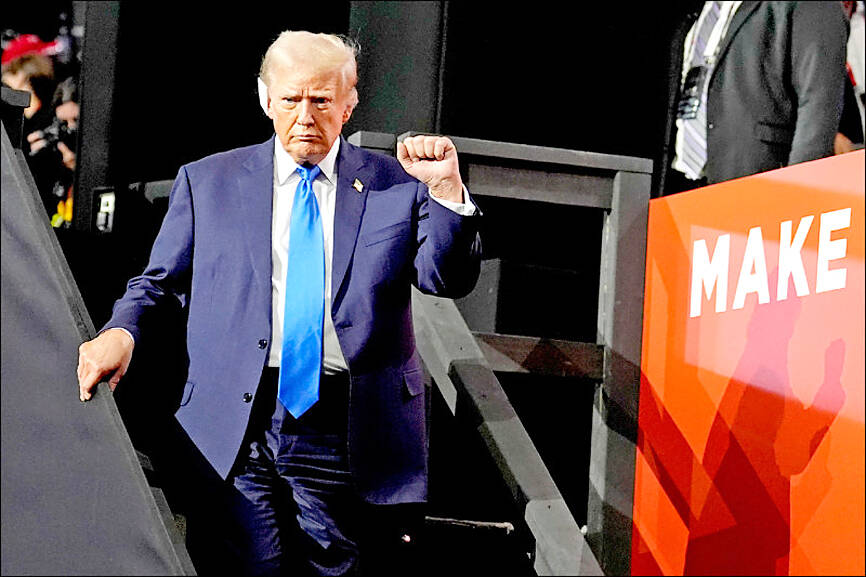The US-based Center for Strategic and International Studies (CSIS) think tank on Thursday held an online forum aimed at understanding public opinion in Taiwan, with a focus on Taiwanese views on the US, US-China relations and cross-strait relations, based on data gathered by Academia Sinica’s Institute of European and American Studies “American Portrait” survey.
The survey, which was conducted in May, showed that about 46.2 percent of respondents said that former US president and Republican Party presidential candidate Donald Trump’s election would have an impact on the US’ willingness to defend Taiwan, while 37.5 percent of respondents said Trump’s election would increase the US’ willingness to defend Taiwan.
Institute assistant research fellow James Lee (李語堂), a participant in the CSIS forum, said: “People think that Trump being elected would have an impact on US willingness to defend Taiwan, but they don’t have a consensus on whether it would decrease or increase the US commitment to Taiwan.”

Photo: AP
Perceptions of Trump’s impact on US policy are strongly influenced by partisanship and national identity, Lee said.
About 41.2 percent of respondents said they felt that the US was credibly reliant, up from 33.9 percent last year, the survey showed.
Meanwhile, 80.9 percent of respondents said that China was not credible. However, the number of respondents finding China credible rose from 9.3 percent last year to 12.5 percent this year.
As US credibility is hinged on strategic ambiguity, it is difficult for Taiwan to gauge the authenticity of the US’ credibility, Soochow University Department of Sociology assistant professor Pan Hsin-hsin (潘欣欣) said.
The survey showed that 83.4 percent of respondents found that Chinese threats have increased, while 70.4 percent said that continued growth of Chinese military equipment might increase the risk of China militarily invading Taiwan.
Additionally, 59.6 percent of respondents believed the US would militarily intervene in a potential conflict, the survey found.
For the first time since they survey’s launch in 2021, it asked whether respondents were willing to take up arms in defense of their country, which yielded a response of 53.5 percent of affirmative responses.
It also found that 71.8 percent of respondents felt that increased air and naval patrols in the Taiwan Strait would increase the possibility of the US militarily assisting Taiwan.
Institute research fellow Wu Chien-huei (吳建輝) said there was optimism about Trump winning the election, but his transactional approach to politics lent significant credence to the US skepticism.
The survey, held between May 23 and May 28, used computer-assisted phone interviews to interview adults aged 20 and above, yielding valid samples numbering 1,236 with a level of confidence of 95 percent.
Additional reporting by CNA

POSITIVE DEVELOPMENT: Japan and the US are expected to hold in-depth discussions on Taiwan-related issues during the meeting next month, Japanese sources said The holding of a Japan-US leaders’ meeting ahead of US President Donald Trump’s visit to China is positive news for Taiwan, former Japan-Taiwan Exchange Association representative Hiroyasu Izumi said yesterday. After the Liberal Democratic Party’s landslide victory in Japan’s House of Representatives election, Japanese Prime Minister Sanae Takaichi is scheduled to visit the US next month, where she is to meet with Trump ahead of the US president’s planned visit to China from March 31 to April 2 for a meeting with Chinese President Xi Jinping (習近平). Japan and the US are expected to hold in-depth discussions on Taiwan-related issues during the

‘LIKE-MINDED PARTNER’: Tako van Popta said it would be inappropriate to delay signing the deal with Taiwan because of China, adding he would promote the issue Canadian senators have stressed Taiwan’s importance for international trade and expressed enthusiasm for ensuring the Taiwan-Canada trade cooperation framework agreement is implemented this year. Representative to Canada Harry Tseng (曾厚仁) in an interview with the Central News Agency (CNA) said he was increasingly uneasy about Ottawa’s delays in signing the agreement, especially as Ottawa has warmed toward Beijing. There are “no negotiations left. Not only [is it] initialed, we have three versions of the text ready: English, French and Mandarin,” Tseng said. “That tells you how close we are to the final signature.” Tseng said that he hoped Canadian Prime Minister Mark Carney

President William Lai (賴清德) yesterday bestowed one of Taiwan’s highest honors on Saint Vincent and the Grenadines (SVG) Ambassador Andrea Clare Bowman in recognition of her contributions to bilateral ties. “By conferring the Order of Brilliant Star with Grand Cordon on Ambassador Bowman today, I want to sincerely thank her, on behalf of the Taiwanese people, for her outstanding contribution to deepening diplomatic ties between Taiwan and SVG,” Lai said at a ceremony held at the Presidential Office in Taipei. He noted that Bowman became SVG’s first ambassador to Taiwan in 2019 and

A man walks past elementary school artworks at the Taipei Lantern Festival in Ximen District yesterday, the first day of the event. The festival is to run from 5pm to 10pm through March 15.